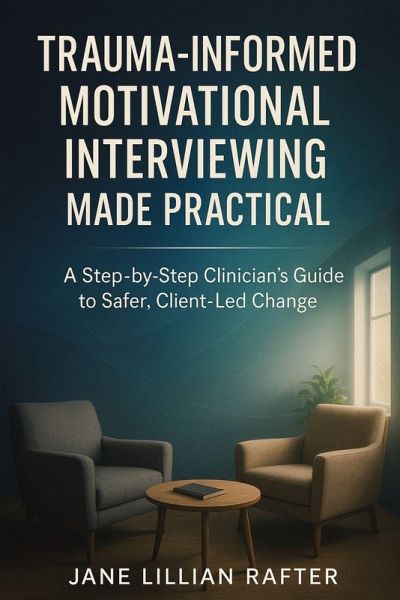
Trauma-Informed Motivational Interviewing Made Practical
A Step-by-Step Clinician's Guide to Safer, Client-Led Change
Versandkostenfrei!
Versandfertig in 1-2 Wochen
14,99 €
inkl. MwSt.

PAYBACK Punkte
7 °P sammeln!
Help clients move toward change without re-triggering them. This practical guide shows you how to apply Motivational Interviewing (MI) with a clear trauma lens. You will learn how to keep sessions safe, pace skilfully, and use MI techniques that fit the window of tolerance. The book turns theory into steps you can use right away. What this book teaches Trauma-informed MI basics: MI spirit, collaboration, and autonomy-applied with safety, consent, and choice. Safety first: grounding, de-escalation, and when to pause or slow an MI process. OARS with care: open questions, affirmations, reflection...
Help clients move toward change without re-triggering them. This practical guide shows you how to apply Motivational Interviewing (MI) with a clear trauma lens. You will learn how to keep sessions safe, pace skilfully, and use MI techniques that fit the window of tolerance. The book turns theory into steps you can use right away. What this book teaches Trauma-informed MI basics: MI spirit, collaboration, and autonomy-applied with safety, consent, and choice. Safety first: grounding, de-escalation, and when to pause or slow an MI process. OARS with care: open questions, affirmations, reflections, and summaries adapted for trauma cues and shame reactions. Pacing and timing: spotting signs of overload, titrating tasks, and keeping arousal within a workable range. Change talk that doesn't push: evoking reasons for change while protecting dignity and control. Managing avoidance and stuck points: gentle strategies that reduce fight, flight, freeze, or appease patterns. Cultural and historical context: using cultural humility and language that respects lived experience. Risk and crisis moments: brief plans, role-play prompts, and stepwise actions you can follow under pressure. Working across settings: mental health, substance use, primary care, schools, justice, and community services. Clinician care: supervision check-ins, boundaries, and simple routines that limit vicarious trauma. What's inside Step-by-step skills labs: short exercises to practise reflections, double-sided reflections, and summaries that lower threat. Ready-made scripts: first-session openings, consent language, soft starters, and repairs after a rupture. Who this book is for Counsellors, psychotherapists, psychologists, social workers, nurses, GPs, peer workers, and trainees who use MI. Teams in addiction services, trauma clinics, crisis teams, schools, and primary care who need a shared, simple playbook. Supervisors who want clear prompts for skills rehearsal and case review..












